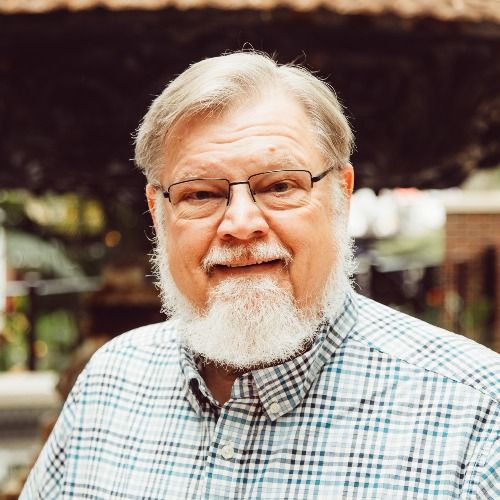Episode 942
Divine Liberation: A Profound Exploration of Romans 9 and 10
The "Daily Bible Refresh" is presented each day by Rev. Dr. Brad Miller who has a goal of speaking a bit of the bible into two million ears (one million people) in three years (2025-2028).
He is the author of "The A, B, C-1,2,3 Bible Study Guide" Free to you by clicking HERE.
Brad served as a local church pastor for forty years and has a background in radio and podcasting. Moreover, he is a life-long student of The Bible.
He believes in the words of Jesus that “scripture is fulfilled in your hearing” (Luke 4:21)
The "Daily Bible Refresh" is available seven days a week by 6:00 am ET. The episodes are no longer than ten minutes long and are...
- Understandable: A reading from the New Testament (usually the Gospel) selected from the Revised Common Lectionary using "The Message" translation.
- Relatable: You will have a couple of "points to ponder" from the text which will relate to your life
- Applicable: Every episode includes a way you can take action based on the reading
- A recommended resource to help you go deeper in biblical study and spiritual direction.
- A prayer for your day.
A companion resource to the Voice of God Daily Podcast is the “ABC Bible Study Guide” available by clicking HERE.
The "Daily Bible Refresh" is available every day at VoiceofGodDaily.com on Apple Podcasts, Spotify and all major podcast directories.
You can help Dr. Brad attain his goal of getting a bit of the bible into two million ears by subscribing to "Daily Bible Refresh" on Apple Podcasts, leaving a five-star rating, and writing a review. More importantly please share with your network of family and friends about the "Daily Bible Refresh".
Please make listening to the "Daily Bible Refresh" a part of your daily life.
Remember… “All scripture is God-breathed and useful”(2 Timothy 3:16)
The discourse presented in this episode embarks upon a profound exploration of the theological implications derived from the passages of Romans chapters 9 and 10. The speaker, Dr. Brad Miller, elucidates the concept of divine liberation, which transcends mere religious performance, urging the listener to reconsider the foundations of their faith. He posits that the prevailing notion of salvation, often confined within the parameters of religious law and performance, is fundamentally flawed. Instead, he advocates for a perspective that emphasizes divine inclusion, revealing that God's grace is not predicated upon one's adherence to religious tenets but is freely bestowed upon all, thus challenging traditional theological boundaries. This radical reframing of divine selection emphasizes that God's love encompasses all, including those historically marginalized by institutional religion, fostering a spirit of inclusivity that is particularly pertinent in contemporary discourse surrounding LGBTQ+ inclusion and interfaith dialogue.
As the discussion progresses, Dr. Miller critiques the pitfalls of religious achievement, asserting that many individuals become so engrossed in their own spiritual endeavors that they inadvertently overlook the essence of divine grace. He articulates a poignant metaphor, likening God to a stone placed in the path toward righteousness, which, rather than serving as an obstacle, is an invitation to embrace a relationship with the divine that is immediate and personal. The speaker contends that true salvation is not a distant aspiration but is as proximate as the very breath we take, thereby inviting the audience to engage in a more profound, trusting relationship with God.
Furthermore, Dr. Miller concludes with actionable steps for the listeners, encouraging practices of holy listening and noticing. By being attuned to the divine presence in their everyday lives, individuals can cultivate a deeper awareness of the love and healing that surround them. This approach not only aligns with the episode's core message about the nature of salvation but also offers practical guidance for living a life that acknowledges and responds to the continual work of God within and among us.
Takeaways:
- The podcast emphasizes the importance of divine inclusion, illustrating that God's love transcends traditional religious boundaries and extends to all individuals, regardless of their background.
- Paul critiques the tendency to seek salvation through religious performance, advocating instead for an understanding of divine love that is freely given and not earned through human efforts.
- Listeners are encouraged to practice holy listening, which involves being present and aware of divine love in their daily lives, relationships, and work for justice.
- The reading from Romans highlights the concept of salvation as being as near as one's own heart, suggesting that divine presence is intimately connected to our embodied experience.
- The episode calls for a reevaluation of how we perceive religious achievement, advocating for a focus on trusting God rather than relying solely on our own righteousness.
- The host invites listeners to engage in personal reflection, prompting them to notice moments of healing and divine love throughout their day-to-day experiences.
Links referenced in this episode:
Companies mentioned in this episode:
- voiceofgodddaily.com
Transcript
Going beyond religious Performance to divine liberation A reflection on Romans 9, 30, 10, 10 on the Daily Bible refresh hello my friend Dr. Brad Miller here with the Daily Bible Refresh.
Speaker A:This is your daily reading of the Bible from a progressive point of view.
Speaker A:In a bit I will read the New Testament lessons selected from the Revised Common Lectionary for this very day.
Speaker A:The reading is understandable.
Speaker A:I use the message version relatable.
Speaker A:Please listen to the points to ponder and applicable with action steps you can take.
Speaker A:We pray and are done in less than 10 minutes.
Speaker A:It's all brought to you by voiceofgodddaily.com which is the home of your free personal Bible Study Guide, the ABC 1, 2, 3 Bible Study Method.
Speaker A: lionaires a million people by: Speaker A:You can help by saving and subscribing to the podcast and tagging your friends.
Speaker A:Here's today's reading.
Speaker A:The reading is from Romans 9, 30, 10, 10.
Speaker A:Reading from the message who in the world do you think you are to second guess God?
Speaker A:Do you for one moment suppose any of us knows enough to call God into question?
Speaker A:Clay doesn't talk back to the fingers that mold it, saying, why did you shape me like this?
Speaker A:Isn't it obvious that a potter has a perfect right to shape one lump of clay into a vase for holding flowers and another into a pot for cooking beans?
Speaker A:If God needs one style of pottery especially designed to show his angry displeasure, another style carefully crafted to show his glorious goodness, isn't that.
Speaker A:Isn't that all right?
Speaker A:Either or both, happens to Jews, but it also happens to other people.
Speaker A:Hosea put it well, I'll call nobodies and make them somebodies.
Speaker A:I'll call the unloved and make them beloved.
Speaker A:In the place where they yelled at you're nobody.
Speaker A:They're calling you God's living children.
Speaker A:Isaiah maintain the same emphasis.
Speaker A:If each grain of sand on the seashore were numbered and the sum labeled Chosen of God, they'd be numbers still not names.
Speaker A:Salvation comes by personal selection.
Speaker A:God doesn't count us.
Speaker A:He calls us by name.
Speaker A:Arithmetic is not his focus.
Speaker A:Isaiah had looked ahead and spoken the truth.
Speaker A:If our powerful God had not provided us a legacy of living children, we would have ended up like ghost towns like Sodom and Gomorrah.
Speaker A:How can we sum this up?
Speaker A:All those people who didn't seem interested in what God was doing actually embraced what God was doing as he straightened out their lives.
Speaker A:And Israel, who seemed so interested in reading and talking about what God was doing.
Speaker A:Missed it.
Speaker A:How could they miss it?
Speaker A:Because instead of trusting God, they took over.
Speaker A:They were absorbed in what they themselves were doing.
Speaker A:They were so absorbed in their God projects that they didn't notice God right in front of them, like a huge rock in the middle of the road.
Speaker A:And so they stumbled into him and went sprawling.
Speaker A:Isaiah again gives us the metaphor for pulling this together.
Speaker A:Careful.
Speaker A:I put a huge stone on the road to Mount Zion.
Speaker A:A stone you can't get around.
Speaker A:But the stone is me.
Speaker A:If you're looking for me, you'll find me on the way, not in the way.
Speaker A:Israel reduced to religion Believe me, friends, all I want for Israel is what's best for Israel.
Speaker A:Salvation, nothing less.
Speaker A:I want it with all my heart and pray to God for it all the time.
Speaker A:I readily admit that the Jews are impressively energetic regarding God, but they are doing everything exactly backward.
Speaker A:They don't seem to realize that this comprehensive setting things right, I.e.
Speaker A:salvation, is God's business and most flourishing business.
Speaker A:It is right across the street they set up their own salvation shops and noisily pedal their knockoffs.
Speaker A:All of these years of refusing to really deal with God on His terms, insisting instead of making their own deals, they have nothing to show for it.
Speaker A:The earlier revelation was intended simply to get us ready for the Messiah, who then puts everything right for those who trust in Him.
Speaker A:Moses wrote that anyone who insists on using the law code to live right before God soon discovers it's not so easy.
Speaker A:Every detail of life regulated by fine print.
Speaker A:But trusting God to shape the right living in us is a different story.
Speaker A:No precarious climb up to heaven.
Speaker A:Up to heaven to recruit the Messiah.
Speaker A:No dangerous descent into hell to rescue the Messiah.
Speaker A:So what exactly was Moses saying?
Speaker A:The word that saves us.
Speaker A:Right here.
Speaker A:As near as the tongue in your mouth, as close as the heart in your chest.
Speaker A:It's the word of faith that welcomes God to go to work and set things right for us.
Speaker A:This is the core of our preaching.
Speaker A:Say the welcoming word of God.
Speaker A:Jesus is my master embracing body and soul.
Speaker A:God's work of doing in us what he did in raising Jesus from the dead.
Speaker A:That's it.
Speaker A:You're not doing anything.
Speaker A:You're simply calling out to God, trusting Him to do it for you.
Speaker A:That's salvation.
Speaker A:With your whole being.
Speaker A:You embrace God setting things right.
Speaker A:Then you say it right out loud.
Speaker A:God has set everything right before him and me.
Speaker A:Well, that.
Speaker A:That ends the scripture here.
Speaker A:And where Paul is really challenging our understanding of Salvation in relationship to religious effort so let's talk about some points to ponder.
Speaker A:The first one is about divine inclusion.
Speaker A:Paul radically refine, reframes divine selection from exclusive choosing to expansive inclusion.
Speaker A:I'll call nobody's and make them somebody, as the scripture says.
Speaker A:This suggests that God's love operates that God's love operates outside traditional religious boundaries, challenging any theology that claims exclusive access to divine grace in our context.
Speaker A:This affirms LBGTQ inclusion, interfaith dialogue, and welcomes the marginalized who have been left out often in institutional religion.
Speaker A:Let's talk about another point to ponder about going beyond religious achievement.
Speaker A:Paul critiques those doing everything exactly backward.
Speaker A:He says by trying to achieve salvation through religious performance.
Speaker A:Progressive Christianity recognizes that divine love isn't earned through correct beliefs or practices, but freely given.
Speaker A:This challenges both fundamentalist certainty and progressive perfectionism that can manifest as political or moral superiority.
Speaker A:The third point is about embodied trust.
Speaker A:The text of the Bible here locates salvation not in a distant heaven or some complex theology, but as as near as the tongue in your mouth and as close as the heart in your chest.
Speaker A:This suggests that divine presence is found in our embodied experience, our relationships and our work for justice, not an abstract doctrine or religions.
Speaker A:So here's our action step for the day.
Speaker A:Practice holy listening or holy noticing.
Speaker A:Set even.
Speaker A:You might even want to set an alarm on your phone.
Speaker A:When the alarm goes off, pause and notice what is happening in your world at that time.
Speaker A:What divine love is present in your life in that moment, in your body, in your relationships, in your work.
Speaker A:Whatever you do.
Speaker A:How is healing happening around you?
Speaker A:There's no need to manufacture spiritual experience.
Speaker A:Notice what is happening around it, around you.
Speaker A:We're going to pray.
Speaker A:Just a minute.
Speaker A:But I also did want you to know that we do have a resource for you to use in your home Bible study.
Speaker A:It's called the ABC 123 Bible Study Method.
Speaker A:You can pick it up at our website, voiceofgodaily.com let's pray.
Speaker A:Oh God, you are a source of boundless love.
Speaker A:When we get caught up in religious scorekeeping, remind us that you're already here, as close as our breath, as present as our heartbeat.
Speaker A:Free us from the exhausting work of trying to earn what's freely given.
Speaker A:Help us to trust that your love is bigger than our boxes, wider than our walls, more inclusive than our institutions.
Speaker A:And show us how to simply welcome the work you are already doing in us and through us.
Speaker A:Amen.
Speaker A:My friend, I am delighted you chose to join me for today's reading, the Daily Bible Refresh is completely listeners supported.
Speaker A: on years, a million people by: Speaker A:I would be so grateful if you would go to voiceofgodddaily.com and share your gift of any amount.
Speaker A:Thanks much.
Speaker A:My name is Dr. Brad Miller and I'll be right here tomorrow with your Daily Bible Refresh.
Speaker A:Please subscribe and tag your friends until tomorrow.
Speaker A:Remember, God's loyal love doesn't run out.
Speaker A:His merciful love hasn't dried up, it's created new every morning.



